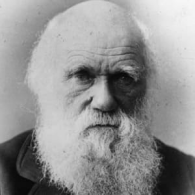
(12 February 1809 – 19 April 1882) was an English naturalist
. He established that all species
of life have descended over time from common ancestry
, and proposed the scientific theory
that this branching pattern
of evolution
resulted from a process that he called natural selection
.
He published his theory with compelling evidence for evolution in his 1859 book On the Origin of Species, overcoming scientific rejection of earlier concepts of transmutation of species
.
There is one living spirit, prevalent over this world ... which assumes a multitude of forms according to subordinate laws. There is one thinking sensible principle allied to one kind of organic matter. ![]()
We can allow satellites, planets, suns, universe, nay whole systems of universe, to be governed by laws, but the smallest insect, we wish to be created at once by special act.![]()
Our faculties are more fitted to recognize the wonderful structure of a beetle than a Universe.![]()
I feel most deeply that this whole question of Creation is too profound for human intellect. A dog might as well speculate on the mind of Newton! Let each man hope and believe what he can.![]()
Physiological experiment on animals is justifiable for real investigation, but not for mere damnable and detestable curiosity.![]()
I love fools' experiments. I am always making them.![]()

